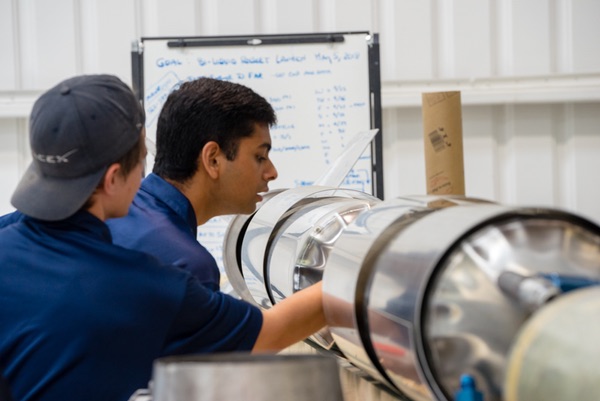A new rocketry—and workforce—competitionby Jeff Foust
|
| “This will be the only national STEM talent development strategy that literally is developing a vetted pipeline of talent all the way from high school, community college, university, into our industry partners,” Taylor said. |
A new competition hopes to capitalize on, and expand, that interest. Last month Base 11, a nonprofit organization that identifies itself as a “workforce development accelerator focused on solving the STEM talent pipeline crisis being fueled by the underrepresentation of women and minorities,” announced the Base 11 Space Challenge. The competition offers a $1 million grand prize to the first student team to develop a single-stage liquid-propellant rocket that flies to at least 100 kilometers.
“We see space as a huge economic frontier,” said Landon Taylor, CEO of Base 11, in an interview last month. “We see it as a great business case for our focus in preparing the workforce that is going to be needed by industry, by government, to take advantage of that.”
The competition, he argued, would help attract students to the industry and give them hands-on experience that will make them attractive to future employers. “This will be the only national STEM talent development strategy that literally is developing a vetted pipeline of talent all the way from high school, community college, university, into our industry partners,” he said.
Registration for the competition started last month at its announcement in Compton, California, and runs through the end of September. Teams then step through a series of reviews and static fire tests. The first of four launch windows to actually attempt a flight to 100 kilometers opens in May 2020, with the final one in December 2021.
The length of the competition—up to three and a half years—means that many of the students who start on it now won’t be in school by the time it ends. One aspect of the first year of the competition will be for teams to not only work on the preliminary design of their rocket but also succession planning, said Christine Byrd of Base 11.
The teams will also have to work on outreach: the competition requires each university team to join forces with both a community college and a high school. “We didn’t see a lot of diversity” in initial discussions with potential universities, Taylor said. “Let’s have a mandatory requirement for teams to partner with at least one community college and one high school to collaborate with them and have a strategy to do outreach.”
At the time of last month’s announcement, several universities expressed an interest in signing up, including Purdue University. “We have over 40 students who have never worked in a laboratory before,” said Christopher Nilsen of Purdue. Efforts like this, he said, are giving them hands-on experience that might be difficult to come by otherwise. “Students who never turned a wrench are now learning how to put together complex propulsion systems.”
The launch attempts in 2020 and 2021 will take place at Spaceport America. “The thing that really attracted me at the spaceport was their mission” of STEM education, said Dan Hicks, head of the spaceport. That included, he said, attracting people in “underresourced” parts of the country, like parts of New Mexico. “It was a natural fit for me.”
He added he didn’t see a conflict between the Base 11 Space Challenge and the Spaceport America Cup. “I see it as kind of a symbiotic relationship,” he said, with many of the teams competing at the cup also participating in the more technically challenging Base 11 competition, using the cup to test designs and technologies for the Base 11 challenge.
| “Students who never turned a wrench are now learning how to put together complex propulsion systems,” said Purdue’s Nilsen. |
Taylor said that the competition has the prize purse in the bank should a team win in by the end of 2021. “We didn’t want to announce a contest and then go find the money,” he said. Base 11 has raised $1.15 million, which covers both the prize purse and a $50,000 prize for the best static fire test. He added there will be “innovation pop-up challenges” as the competition proceeds based on specific needs or interests of the teams and sponsors.
Taylor said Base 11 is separately working to develop partnerships with historically black colleges and universities. “Aside from a couple universities, many of them do not have a great amount of traction in the area of rocketry,” he said. “A part of the plan is to bring those universities up.” That effort, he added, will include a $1.5 million grant that will be awarded to one of those universities to fund a rocketry lab.
Among the companies backing the competition is software company Dassault Systèmes. “A major component lacking in our education system today is experiential, hands-on learning,” said Al Bunshaft, senior vice president of the company and head of its US foundation. “We think this is exactly the right kind of initiative to not only educate but inspire young people.”
Note: we are temporarily moderating all comments subcommitted to deal with a surge in spam.
